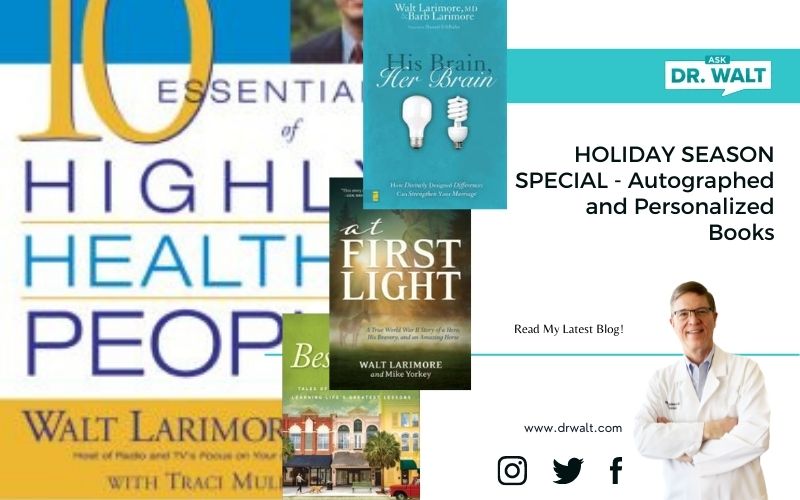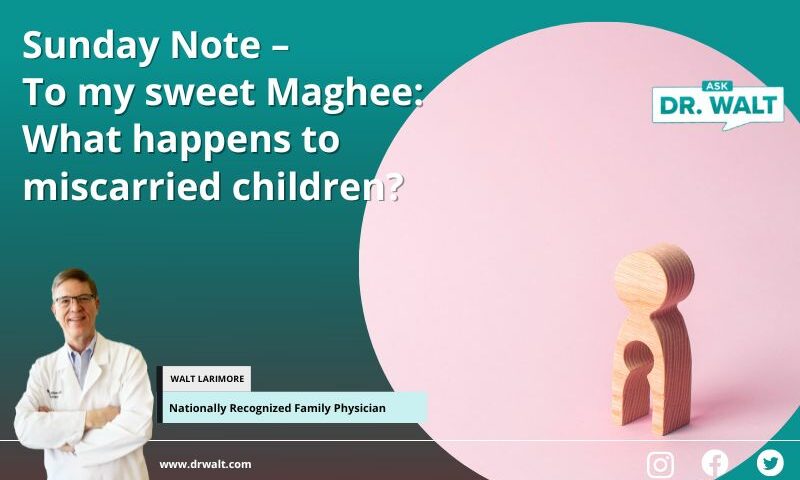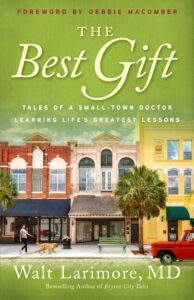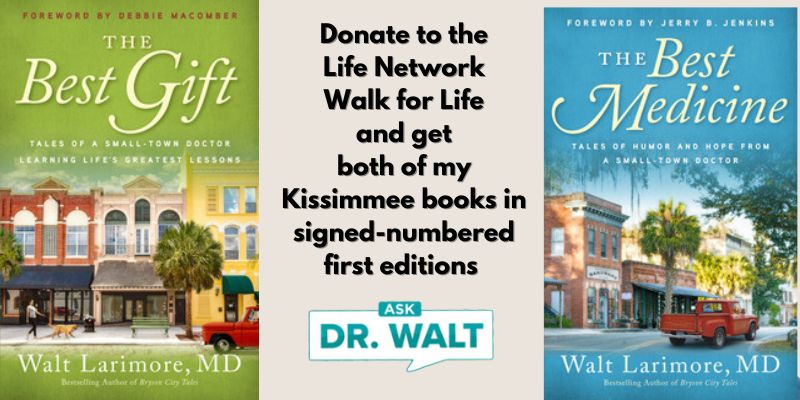
HOLIDAY SEASON SPECIAL – Autographed and Personalized Books
November 12, 2022
Ultra-processed foods increase obesity and health complications
November 14, 2022A person who is very special to me, Maghee, and her husband were overjoyed to be expecting their second son. This week they learned that the Lord had called their baby to heaven at 19 weeks of gestation. Barb and I know the tears that they now spill. But if sweet Maghee was with me, what would I say? What would you?
When Maghee was ready, I would share with her and her husband three things:
1) We’ve walked this path and know your pain
I’d share with Maghee what I wrote about our four miscarriages in my book, The Best Gift: Tales of a Small-Town Doctor Learning Life’s Greatest Lessons based upon my journals from those painful years:
After Kate and Scott were born, Barb and I lost four babies in a row to miscarriage (one in Bryson City and three in Kissimmee). Each conception began a journey that we neither expected nor desired.
After the conception of each tiny unborn child came ultrasounds, showing what appeared to be healthy little ones—moving, kicking, squirming, hiccoughing, and thumb sucking.
Their minuscule size didn’t keep us from falling head over heels in love with each one.
“Because after all, a person’s a person, no matter how small,” as Dr. Seuss so eloquently proclaimed in Horton Hears a Who.[i]
With each pint-sized person a thousand hopes and aspirations arose in our hearts. We felt each child move and kick—what we physicians call quickening, the moment in pregnancy when the woman feels or perceives her unborn baby stirring in her womb.
The word quick originally meant “alive.”
We prayed for each child and discussed potential names.
Our families and friends shared our joy and excitement over each unborn child, and Kate and Scott were old enough to share our excitement as well.
Our spirits soared in mounting anticipation and expectation.
And then, with each pregnancy came a day when Barb could no longer sense our baby moving.
The dreaded ultrasounds that followed showed no heartbeat, and blood tests indicated plummeting levels of the pregnancy hormone, hCG (human chorionic gonadotropin). Both would confirm what our hearts knew to be true—another death.
What followed each loss was a season of indescribable agony, angst, and anguish.
The surprise to me, as a physician, was how each subsequent loss became more painful and challenging than the one before and how each became more excruciating—a phenomenon I found in the years that followed that my patients also experienced with child loss.
Each death of a child was a blow to our hearts that weighed our spirits down, close to the point of snapping.
But even worse, the weight and burden of each subsequent loss was increasingly unbearable for both of us but especially for Barb.
Friends prayed early and often that the Lord would protect the life and health of our last unborn baby, but God’s answer was, “No. I’ll take this one to heaven with me.”
With our fourth loss, life nearly stopped.
That loss was the beginning of a period of dark, dreary days for us.
But over time, as God had promised, “I will turn their mourning into joy. I will comfort them and exchange their sorrow for rejoicing.”[i]
With time, as our sorrow and grief slowly subsided, our God met us in fresh ways. He saw and gathered our tears.[ii] He drew near,[iii] held us close,[iv] and whispered, “Blessed are you who weep now.”[v]
I was reassured to see in Scripture a Father God who feels sorrow and even weeps for the wounds and blows, both emotional and physical, of his people.
Scripture tells me God’s “eyes pour out tears” when His “dear, dear people are battered and bruised,”[vi] and, “the Lord is close to the brokenhearted; He rescues those whose spirits are crushed.”[vii]
Another version of the same verse says, “If your heart is broken, you’ll find God right there; if you’re kicked in the gut, He’ll help you catch your breath.”[viii]
Scripture paints a beautiful picture of a heavenly Father who expresses powerful emotions such as anger[ix] and rejoicing,[x] as well as compassion,[xi] sadness,[xii] and yes, even grief,[xiii] all covered with the icing of His love, the core of His character.[xiv]
It comforted me to think He wept as we did over our losses and now rejoiced with us as we, not knowing what our future held, were confident and trusting in Him, the One who held our future and us in His hands.
2) Your tears will not be wasted but will be treasured and redeemed
Before I shared any more from my journals, I’d tell Maghee and her husband that their tears will not only NOT be wasted, but treasured.
Vivian Bricker wrote a beautiful piece for CT titled, “Does God Really Collect Our Tears in a Bottle?” where she writes, “The next time you cry, remember the truth that God is collecting every tear in His bottle that will never be broken, and He is keeping it right beside Him forever. He will never forget your pain, grief, or sorrow.”
She bases this on Psalm 56:8 which says, “You keep track of all my sorrows. You have collected all my tears in your bottle. You have recorded each one in Your book” (NLT).
Vivian explains:
These are beautiful words written by David when he was undergoing a dark time in his life.
When David wrote this Psalm, he was captured by the Philistines in Gath. If David wrote these words while he was in distress, does it mean he was just using poetic language, or does God really collect and keep our tears in a literal bottle?
The concept of God keeping David’s tears in a bottle comes from the ancient practice of lachrymatories as “there is an allusion here to the custom of collecting tears shed in a time of calamity and sorrow, and preserving them in a small bottle or ‘lachrymatory,’ as a memorial of the grief.”
When David says that God is keeping his tears in a bottle, David is referring to the fact that God remembers all of our sorrows, pains, and griefs. God remembers every single tear that we shed, and He will never forget the great amount of tears that have streamed down our faces.
Just as God collected and remembers David’s tears, so does God remember all of our tears. David trusts that God is for Him and that God will not allow his enemies to overtake him. In his writing in Psalm 56:8, he is reflecting on God’s promises and His faithfulness.
In the same way, we as Christians need to reflect, recall, and remember that God sees all of our pain and it is never for nothing.
Anytime we cry, God sees it. It is not as if God sees our pain and then forgets all about it. Instead, God sees our tears and remembers them. Every tear that falls from our eyes He remembers. The Lord knows what it feels like to feel sorrow, pain, and grief.In the future, every tear of ours will be wiped away by God. Revelation 21:4 tells us, “He will wipe every tear from their eyes. There will be no more death or mourning or crying or pain, for the old order of things has passed away.” In the New Heaven and New Earth, there will be no more crying, pain, or death.
There will only be happiness, joy, and love. Each time we cry, we need to remember this vital truth. Even if we find ourselves in difficult seasons throughout our lives, we can trust in the knowledge that God sees our pain and it will not endure forever.
If you are going through a difficult time today, rest in the knowledge that God sees your pain. He knows the pain, sorrow, and depression you feel. He is storing them up in His memory and He will never fail to recall your grief. Look forward to the day where there will be no more pain.
2) Your baby is safe and you’ll be with him again
Then, I’d tell Maghee and Brandon the “rest of the story” from my journals and book:
A week or two after losing our fourth unborn baby to miscarriage, Barb and I shared dinner with our mentors, Bill and Jane Judge.
Barb looked at the Judges during dessert and suddenly asked a question that must have been troubling her heart for some time: “Do you think our miscarried children went to heaven?”
I was proud of her courage in asking. Jane answered, “Oh, honey, of course they did!”
“How do you know?” Barb asked, her eyes getting misty. “Is there anything in the Bible that says this?”
Bill nodded. “I think the best example is the story of David’s unborn son, who was conceived out of adultery with Bathsheba. The Bible says the Lord ‘struck’ the child, and it became ill.
“For seven days, David fasted and prayed the child would live, but he died. David calls his unborn son his child.
“Following his baby’s death, David washes, eats, and worships. When asked why he was acting this way, he said, ‘He is dead. Why should I fast? Can I bring him back again? I shall go to him, but he will not return to me.’”[i]
Bill took a deep breath. “Barb, to me, it’s clear that David is saying he will see his unborn son in heaven.”
“But is that just true for King David’s baby?” Barb asked. “How about our babies?”
Bill’s voice showed no irritation with the challenge to his answer—only warmth and compassion.
“Let me explain what I’ve learned about God’s character on this matter. The Bible tells us God creates all human beings in his image. Every individual ever conceived bears this image, right from the instant of conception.
“Even when just a single cell, the microscopic baby is fully human and carries God’s image. We know this because the Bible tells us that before God forms us in the womb, he knows us.”[ii]
“But what about sin?” Barb asked. “What about the psalm that says we are sinful from the time of conception and at birth?[iii] Can an unborn baby or child go to heaven if they don’t know Jesus?”
“By all means, yes!” Bill answered.
“How?” Tears formed in her eyes. “How can we be sure?”
Barb signaled to me that she wanted the handkerchief I always carried in my pocket.
“The simple answer is that young children have not rejected Jesus,” Bill said, “so his sacrifice covers them—as does his love. At death, they immediately pass into God’s presence. We will see them again.”
Barb breathed a sigh of relief, and I saw a glimmer of a smile. “One last question that I’ve been pondering is this: When I see our babies in heaven, will they be babies or children or grown-ups?”
“Well,” Bill began, “the Bible doesn’t say for sure, but I believe with all my heart that the arms and hearts of mothers that have ached for their lost children will have the opportunity of hugging them, and the father’s hand, which never held the little hand, will be given the privilege.”[iv]
Barb took a deep breath and blew her nose. After wiping her tears, she reached out and took my hand, eyes still on our dinner guests. “Bill, I can’t tell you how much this means to me—to us! Thank you so much.”
“You’re welcome. But most of all, this experience tells me that we follow and serve a great God. One who loves little children and us more than we can imagine.”
Barb and I were so relieved to understand that we will see and meet the four children we never saw. We’ll hold them close and hug them tight.
They could be babies or they could be as big as NFL linemen, but they will be there waiting for us.
For years, we have remembered them by honoring them on the anniversary of the days they entered heaven—January 29, February 18, May 8, and August 2.
For some time, we weren’t sure why God allowed the tumult and turmoil of four miscarriages.
But we also knew that on this side of heaven, most of our “why” questions don’t have answers, that God’s ways do not always make sense.
That said, we had reached a place where we were at peace because, in his mercy, God showed us a few of the reasons for the storms he either allowed or caused.
Most notably, He used them to draw our family and us closer to each other and closer to Him.
Seeing the ultrasounds and feeling the quickening of each unborn child persuaded us of the sanctity and inestimable value of life from the moment of conception.
In addition, Barb and I now understood the terrible pain both the mother and father experience with the loss of an unborn baby in a way that those who have not walked this path cannot.
We could now sympathize and cry with other couples and be transmitters of comfort and consolation to couples on this sad path.
We became convinced that the millstones of tragedies that had hung around each of our necks would be transformed into stepping-stones of joy.
For us, the full measure of healing comfort that was coming would be a precious gift that would give us much peace and confidence in the future.
**********
My sweet Maghee, for you and your beloved husband, Barb and I pray the same for you both. Love you BIG!
**********
A FOLLOWUP: Not long after writing this blog, Maghee wrote to me:
Thank you so much for the sincere blog that you shared on Sunday. [My husband] and I found great comfort in your words. You and [Barb] are so very special to me and we greatly appreciate you both being here for us during this tender time. I am feeling better and much of that is due to the loving support from you both. My faith does tell me that we will meet our little boy again and that I find great comfort.
**********
TO ORDER OR LEARN MORE ABOUT THIS BOOK CLICK HERE.
© Copyright WLL, INC. 2022.
[i] Dr. Seuss, Horton Hears a Who! (New York: Random House, 1954), 7.
[i] 2 Samuel 12:15–23 ESV.
[ii] Jeremiah 1:5.
[iii] Psalm 51:5.
[iv] J. Vernon McGee, Death of a Little Child (Pasadena, CA: Thru the Bible Radio, 1970), 20.
[i] Jeremiah 31:13 NLT.
[ii] 2 Kings 20:5.
[iii] Psalm 34:18.
[iv] Psalm 27:10 NLT.
[v] Luke 6:21 ESV.
[vi] Jeremiah 14:17 MSG.
[vii] Psalm 34:18 NLT.
[viii] Psalm 34:18 MSG.
[ix] Jeremiah 8:19.
[x] Zephaniah 3:17; Isaiah 62:5.
[xi] Psalm 103:8; Joel 2:13.
[xii] Genesis 6:6; Psalm 78:40.
[xiii] Isaiah 63:10; Psalm 78:40.
[xiv] 1 John 4:8.





